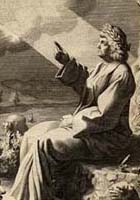Lucretius Biography
Lucretius lived from 99-55 BC. His birth date is not certain, and little is known of his parentage or birthplace. Though often referred to as Lucretius, his official name is Titus Lucretius Carus. Highly educated, he belonged to the aristocratic sector of the Tricipitini, which often emerged in positions of official status.
He craved to free humanity from its unhappiness, which mainly resulted from fear of the afterlife and the gods. He was a moralist and a reformer as well as a scientist, and yet always a poet. His major work, 'De Rerum Natura', sought to do this, borrowing from the work of Democritus, who discovered primitive atomic theories, and Epicurus, who believed that pleasure was the main goal of life. The philosophy of Epicureanism sprung from his beliefs.
In order to achieve this goal of ultimate happiness, the gnawing fears of humanity had to be erased. Lucretius denounced religion as the greatest source of human corruption and anguish. The gods, rather than being a driving force in everyday life, were a model to strive towards. It is rumored that he died from ingesting a love potion, given to him by his wife.
First, then, I say, the mind which oft we call
The intellect, wherein is seated life's
Counsel and regimen, is part no less
Of man than hand and foot and eyes are parts
...
Bodies, again,
Are partly primal germs of things, and partly
Unions deriving from the primal germs.
And those which are the primal germs of things
...
Now come: I will untangle for thy steps
Now by what motions the begetting bodies
Of the world-stuff beget the varied world,
And then forever resolve it when begot,
...
Tartarus, out-belching from his mouth the surge
Of horrible heat- the which are nowhere, nor
Indeed can be: but in this life is fear
Of retributions just and expiations
...
Therefore death to us
Is nothing, nor concerns us in the least,
Since nature of mind is mortal evermore.
And just as in the ages gone before
...
